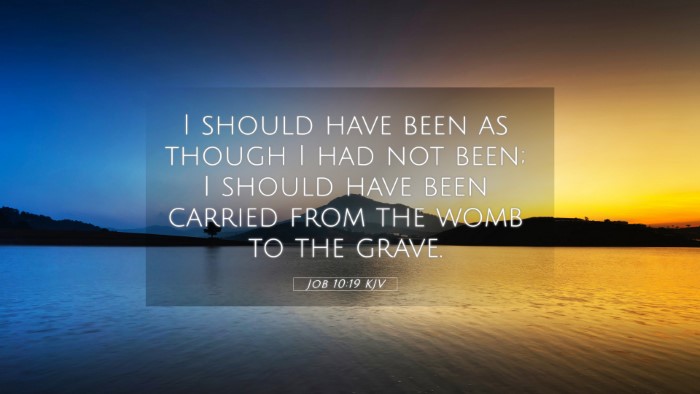Old Testament
Genesis Exodus Leviticus Numbers Deuteronomy Joshua Judges Ruth 1 Samuel 2 Samuel 1 Kings 2 Kings 1 Chronicles 2 Chronicles Ezra Nehemiah Esther Job Psalms Proverbs Ecclesiastes Song of Solomon Isaiah Jeremiah Lamentations Ezekiel Daniel Hosea Joel Amos Obadiah Jonah Micah Nahum Habakkuk Zephaniah Haggai Zechariah MalachiJob 10:19 Similar Verses
Job 10:19 Cross References
I should have been as though I had not been; I should have been carried from the womb to the grave.
Uncover the Rich Themes and Topics of This Bible Verse
Listed below are the Bible themes associated with Job 10:19. We invite you to explore each theme to gain deeper insights into the Scriptures.
Job 10:19 Cross Reference Verses
This section features a detailed cross-reference designed to enrich your understanding of the Scriptures. Below, you will find carefully selected verses that echo the themes and teachings related to Job 10:19 KJV. Click on any image to explore detailed analyses of related Bible verses and uncover deeper theological insights.

Psalms 58:8 (KJV) »
As a snail which melteth, let every one of them pass away: like the untimely birth of a woman, that they may not see the sun.
Job 10:19 Verse Analysis and Similar Verses
Understanding Job 10:19: A Comprehensive Analysis
Job 10:19 reads:
"I should have never been born. I wish I had died before anyone saw me." (Job 10:19, NLT)
Verse Overview
This verse reflects Job's deep despair and existential questioning amidst his suffering. It highlights a moment of intense emotional turmoil where Job reflects on the value of life in the context of his afflictions.
Commentary Insights
Below are synthesizations from renowned Bible commentaries regarding this verse:
-
Matthew Henry:
Henry emphasizes the gravity of Job's lament and the weight of the human experience marked by suffering. Job’s rhetorical expression suggests that in the depths of his suffering, he feels that life itself is a burden rather than a blessing.
-
Albert Barnes:
Barnes posits that this verse reflects Job’s emotional state—one of profound mournfulness and alienation. Job’s wish to have never been born signifies a struggle with identity and purpose in light of anguish.
-
Adam Clarke:
Clarke interprets Job's passionate outcry as a response to his physical and emotional pain. He highlights that Job's experience echoes a universal search for understanding in the face of suffering.
Thematic Connections and Cross-References
Job 10:19 serves as a poignant reminder of the struggles faced by individuals in distress. Here are key Bible verse cross-references that relate to this sentiment:
- Psalm 39:4-5: “Show me, O Lord, my life’s end and the number of my days; let me know how fleeting is my life.”
- Ecclesiastes 4:3: “But better than both is the one who has never been born, who has not seen the evil that is done under the sun.”
- Jeremiah 20:14: “Cursed be the day I was born! May the day my mother bore me not be blessed!”
- Romans 7:24: “What a wretched man I am! Who will rescue me from this body that is subject to death?”
- Philippians 1:21: “For to me, to live is Christ and to die is gain.”
- Lamentations 3:17-18: “I have been deprived of peace; I have forgotten what prosperity is. So I say, ‘My splendour is gone and all that I had hoped from the Lord.’”
- Mark 14:34: “He said to them, ‘My soul is overwhelmed with sorrow to the point of death. Stay here and keep watch.’”
Linking Scriptures and Contextual Themes
The connections between these verses illustrate a recurring theme in Scripture—the struggle with suffering and the search for meaning in pain. Job's expression of wishing he had never been born resonates with many biblical figures who faced unbearable circumstances.
Through cross-referencing, one can see how Job's experience is not isolated; it forms part of a larger narrative within the Bible regarding the human condition. This inter-biblical dialogue opens pathways for understanding how lament is a central aspect of faith.
Tools for Bible Cross-Referencing
When studying Scripture, utilizing tools for cross-referencing can enhance understanding. Resources such as:
- Bible concordances
- Bible reference resources
- Comprehensive Bible cross-reference materials
- Cross-reference Bible study guides
These can aid in exploring thematic Bible verse connections and offer insights into how different parts of the Bible dialogue with one another.
Conclusion
Job 10:19 serves as a reflective point for examining the depths of human suffering and despair. It encourages readers to think deeply about the value of life and the meaning woven throughout the fabric of biblical narratives. By engaging in comparative Bible verse analysis, believers can find solace and insight in shared experiences of suffering among biblical figures.


